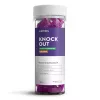If you, like many of us, just can’t seem to go to bed at a reasonable hour, you’ve probably already got melatonin products in your medicine cabinet. So much so, in fact, that you may have an old bottle of melatonin lying around somewhere and are now wondering, is this stuff still good?
Here at Edobles, we want you to improve your life one bite at a time, but if your stuff’s all old and expired… well, that’s not really going to happen.
If you’re thinking of adding melatonin to your rotation but want a little more information first, you’ve also come to the right place! This article is your full guide to the dreamy wonders of natural melatonin, including its many benefits, expiration status, and much more.
So, does melatonin expire? Why don’t you read on and find out!

What is Melatonin?
First things first, let's get acquainted with the star of the show - melatonin!
Melatonin is a naturally occurring hormone in our bodies, mainly produced by the pineal gland. It plays a significant role in regulating our sleep-wake cycle, also known as the circadian rhythm.
When the sun goes down, and darkness sets in, melatonin levels start to rise, gently nudging us toward dreamland. Isn’t it so cool that our bodies know to do that?!
But melatonin isn't just some sleep superhero; it's also an antioxidant. It helps fight those pesky free radicals and has been linked to potential health benefits beyond just sleep. Some studies suggest that melatonin may boost the immune system and even have anti-aging properties. So, it's more than just a one-trick pony!
Research has shown that melatonin can be especially helpful for people with insomnia or jet lag. By taking melatonin supplements, travelers crossing multiple time zones can help reset their internal clocks, making it easier to adapt to the new time zone. As for insomnia, melatonin can be a valuable aid in falling asleep faster and improving sleep quality.
Although melatonin does occur naturally in the body, some people suffer from melatonin deficiency, a type of pineal disorder that causes the body to produce low levels of the hormone. At the risk of putting on our Captain Obvious hats, melatonin supplements are a terrific way to treat this disorder, which can result in:
- Anxiety
- Mood disorders
- Lowered basal body temperature
- Insomnia
- Elevated estrogen/progesterone ratio
- Immune suppression
In other words, you definitely don’t want any of that sleepless smoke!
How Does it Work?
Alright, now that we know what melatonin is, you might be wondering how it works its sleep-inducing magic.
Well, it's quite simple, really. When melatonin levels increase in the evening, it sends signals to our brain that it's time to wind down and prepare for sleep. Like a gentle lullaby, melatonin helps relax our minds and bodies, making it easier to doze off into dreamland.
It's worth mentioning that melatonin is not a sedative, and it won't knock you out like some sleep medications. Instead, it gently nudges your body in the right direction, setting the stage for a peaceful slumber.
So, don't expect a melatonin-induced knockout; it's more like a helping hand in finding that sweet spot of relaxation.
Research has shown that melatonin supplementation can be especially effective for people who have trouble falling asleep due to factors such as shift work, jet lag, or certain medical conditions.
It can also be beneficial for individuals with delayed sleep phase disorder, a condition where the body's natural sleep-wake cycle is significantly delayed, making it difficult to fall asleep at conventional times. Cool, right?

Is Melatonin Safe?
Ah, the age-old question of safety!
Rest assured, sleepless reader, melatonin is generally considered safe for short-term use. In fact, many studies have shown that taking melatonin supplements for up to three months doesn't cause any adverse effects for most people.
However, like with any supplement or medication, there can be some side effects. Some folks might experience mild headaches, dizziness, or daytime drowsiness. But fear not, these side effects are pretty rare and tend to go away on their own once your body adjusts to the melatonin boost.
Research has demonstrated that melatonin is safe and well-tolerated when used appropriately, but it's crucial to follow the recommended dosage guidelines and not exceed the suggested amount without consulting a healthcare professional.
Additionally, it's best to avoid driving or operating heavy machinery after taking melatonin, as it might cause drowsiness in some individuals.
Here's another word of caution: if you're pregnant, breastfeeding, or dealing with certain medical conditions, it's best to have a chat with your friendly neighborhood healthcare provider before adding melatonin to your sleep routine. Ya know what they say, better safe than sorry.
In summary, melatonin is a natural, well-tolerated and safe supplement to take, but don’t go too overboard. We don’t want you sleeping into next century when this one’s just starting!
Does Melatonin Expire?
Alright, here comes the answer to the million-dollar question! Does melatonin expire, or can it last as long as your love for napping on a lazy Sunday afternoon?
Well, the bad news is that melatonin supplements do have an expiration date, so if you’re holding onto your mom’s melatonin pills from five years ago, it’s time to make a trip to the dumpster. However, they do tend to have a pretty decent shelf life, typically ranging from one to three years.
The expiration date is usually printed on the packaging, so keep an eye out for that. After the expiry date, the potency of the melatonin might decrease, meaning it might not be as effective as it once was.
So, it's best not to keep those old, dusty melatonin bottles around for too long.
To ensure you get the most out of your melatonin, store it in a cool, dry place, away from direct sunlight and moisture. If you have any doubts about whether it's still good to use, it's better to play it safe and grab a fresh bottle.
Research has indicated that the stability of melatonin can be influenced by factors such as temperature, humidity, and exposure to light. Storing melatonin in a cool, dark place can help preserve its potency and effectiveness.
Additionally, it's essential to follow the storage instructions provided by the manufacturer to ensure the product remains viable until its expiration date.

How Much Melatonin is Too Much?
Alright, dreamers, let's talk dosages.
Melatonin supplements are available in various strengths, usually ranging from 1mg to 10mg. But the real question is, how much is too much?
Most people find that a low dose, around 0.2mg to 5mg, works like a charm. Taking more than that might not necessarily improve your sleep and could lead to those pesky side effects we mentioned earlier.
Start with a low dose, see how your body responds, and adjust if needed. Remember, it's not about how much melatonin you take, but about finding the Goldilocks zone that's just right for you!
Research has shown that lower doses of melatonin can be just as effective as higher doses in improving sleep quality and duration. In fact, taking too much melatonin might disrupt the natural sleep-wake cycle, leading to difficulties in falling asleep without supplementation.
Can You Overdose on Melatonin?
Picture this: you're lying in bed, and the melatonin isn't kicking in fast enough, so you think, "Why not take a few more? More is better, right?" Not so fast!
While melatonin is generally safe, taking too much of it can lead to unwanted side effects, but it's not a life-threatening situation.
If you happen to take a larger dose than recommended, you might experience some intense drowsiness and feel a bit groggy the next day. But don't worry, it's not going to turn you into Sleeping Beauty for eternity.
Your body will eventually process the excess melatonin, and you'll be back to your regular, well-rested self.
However, just to be on the safe side, always follow the recommended dosage guidelines on the packaging or consult with a healthcare professional if you're unsure.
Research suggests that melatonin is relatively safe even in higher doses, but excessive consumption may result in disrupted sleep patterns, daytime drowsiness, and gastrointestinal issues.
As with any supplement, it's essential to use melatonin responsibly and as directed to avoid potential adverse effects.

7 Common Melatonin Myths: Debunked!
Now that you know the ins and outs of melatonin’s benefits, potential side effects, expiration status, and even overdose concerns, let’s take it a step further and debunk some common myths about the sleep hormone.
Myth #1: Melatonin is Addictive
Nope, not true! Melatonin is non-addictive, and you won't develop a dependence on it with regular use. It's like having a friend that helps you get to sleep when you need it, but you can also go without them if you don't need the assistance.
Myth #2: Melatonin Works Instantly
Melatonin is not a magical sleep potion that works instantly. It usually takes about 30 minutes to an hour to start kicking in. So, if you take melatonin at 11:55, don't expect to turn into a (sleeping) pumpkin at the stroke of midnight.
Myth #3: Melatonin is Only for Sleep Troubles
While melatonin is indeed a sleep superstar, it's not limited to bedtime use only. Some folks find it helpful for managing jet lag when traveling, while others use it to adapt to shift work schedules. It can also be beneficial for individuals dealing with anxiety, as it has a calming effect.
Myth #4: Melatonin is Only for Adults
We call bull! Melatonin can be helpful for kids too. It's been used to manage sleep issues in children with certain conditions, like autism or ADHD. Just remember to consult with a pediatrician to determine the appropriate dosage for the little ones.
Myth #5: All Melatonin Supplements are Created Equal
While melatonin supplements are generally safe, not all of them are created equal. The supplement industry can be a bit of a wild west, so it's essential to choose a reputable brand and opt for high-quality products. Look for supplements that have undergone third-party testing for purity and potency (like us!).
Myth #6: Melatonin is a Sleeping Pill Substitute
Melatonin is more like a sleep facilitator than a substitute for good sleep hygiene. It works best when combined with a healthy sleep routine, not as a stand-alone fix. So, keep those bedtime habits in check!
Myth #7: Melatonin is Only for Night Owls
Even early birds can benefit from melatonin. If you're someone who struggles with falling asleep at your desired bedtime, melatonin might help reset your sleep-wake cycle. Embrace your inner early bird or night owl with the help of this sleep hormone!
Snooze Like a Pro
Alright, now you're armed with all the melatonin knowledge you need to snooze like a pro. As with any health-related decisions, it's always a good idea to consult with a healthcare professional if you have any concerns or specific health conditions.
Remember, getting enough quality sleep is essential for overall well-being, so prioritize those ZZZs. Sweet dreams, my fellow sleep enthusiasts, and may you have many restful nights ahead!
Need a Melatonin Fix?
If your old melatonin products happen to be expired and you’re looking for a new place to get your melatonin, you’re at the right place!
Here at Edobles, we specialize in putting you in the right mood, be it the mood to get out of bed and get active or slide under the covers and have a good night’s sleep.
Here are a few of our greatest (and most delicious) melatonin-infused gummies, because who doesn’t love a little treat before bed?
- Sweet Dreams: Containing 2mg melatonin and the added sleepy potency of chamomile and L-Theanine, these delicious blueberry açai gummies will gently lull you to sleep like never before.
- Deep Dreams: Packing 5mg of melatonin per gummy, these blackberry edibles will get you right to sleep. Not to mention, with CBD, CBN, and L-Theanine in the mix, you’ll never want to leave your bed again!
- Lucid Dreams: These delicious blueberry-flavored gummies only contain 2mg of melatonin, but the blend of our other ingredients, including THCP, CBD, and CBN, make these edibles perfect for deep, restful slumber.

Final Thoughts
Well, folks, there you have it - a full melatonin guide to help you sleep like a baby and wake up feeling refreshed. Melatonin is a fantastic tool to have in your sleep arsenal, but remember, it's not a magical fix for all your sleep woes.
Incorporate healthy sleep habits into your routine, like sticking to a consistent sleep schedule, creating a relaxing bedtime routine, and keeping your sleep environment cozy and inviting.
And if you ever find yourself tossing and turning more often than not, it's a great idea to chat with a healthcare professional to rule out any underlying sleep issues.
And, if anyone ever asks you, “does melatonin expire?” you now have the answer!








